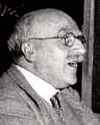 (source)
(source)
|
J.B.S. Haldane
(5 Nov 1892 - 1 Dec 1964)
English geneticist and biometrician.
|
Science Quotes by J.B.S. Haldane (46 quotes)
[Civilization] is a highly complicated invention which has probably been made only once. If it perished it might never be made again. … But it is a poor thing. And if it to be improved there is no hope save in science.
— J.B.S. Haldane
In The Inequality of Man: And Other Essays (1937), 141.
[John Scott Haldane] preferred to work on himself or other human beings who were sufficiently interested in the work to ignore pain or fear … [His] object was not to achieve this state of [pain or fear] but to achieve knowledge which could save other men's lives. His attitute was much more like a good soldier who will risk his life and endure wounds in order to gain victory than that of an ascetic who deliberately undergoes pain. The soldier does not get himself wounded deliberately, and my father did not seek pain in his work though he greeted pain which would have made some people writhe or groan, with laughter.
— J.B.S. Haldane
In R.W. Clark, JBS: The Life and Work of J.B.S. Haldane (1968), quoted in Lawrence K. Altman, Who Goes First? (1986), 215.
[T]he idea of protoplasm, which was really a name for our ignorance, [is] only a little less misleading than the expression “Vital force”.
— J.B.S. Haldane
Adventures of a Biologist (1940), 118.
A discussion between Haldane and a friend began to take a predictable turn. The friend said with a sigh, “It’s no use going on. I know what you will say next, and I know what you will do next.” The distinguished scientist promptly sat down on the floor, turned two back somersaults, and returned to his seat. “There,” he said with a smile. “That’s to prove that you’re not always right.”
— J.B.S. Haldane
As quoted in Clifton Fadiman (ed.), André Bernard (ed.), Bartlett's Book of Anecdotes (2000), 253.
A time will however come (as I believe) when physiology will invade and destroy mathematical physics, as the latter has destroyed geometry.
— J.B.S. Haldane
In Daedalus, or Science and the Future (1923). Reprinted in Krishna R. Dronamraju (ed.),
Haldane’s Daedalus Revisited (1995), 27.
All that biology tells us about the nature of God is that he has “An inordinate fondness for beetles.”
— J.B.S. Haldane
As stated in George Evelyn Hutchison, 'Homage to Santa Rosalia, or Why Are There So Many Kinds of Animals?', The American Naturalist (1959), 93, 145-159.
An attempt to study the evolution of living organisms without reference to cytology would be as futile as an account of stellar evolution which ignored spectroscopy.
— J.B.S. Haldane
'Foreword', in C.D. Darlington, Recent Advances in Cytology (1937), v.
But if we are to control evolution we shall have to find out how to influence gene reproduction in a definite direction, just as organic chemists nowadays work for definite ends. Such a possibility is at present entirely beyond our grasp, but a century hence it may not be so.
— J.B.S. Haldane
In 'The Biochemistry of the Individual' (1937), collected in Neurath Hans (ed.), Perspectives in Biochemistry (1989), 6.
Capitalism, though it may not always give the scientific worker a living wage, will always protect him, as being one of the geese which produce golden eggs for its table.
— J.B.S. Haldane
Daedalus or Science and the Future (1924), 6.
Coming to the question of life being found on other planets, Professor Haldane apologized for discoursing, as a mere biologist, on a subject on which we had been expecting a lecture by a physicist [J. D. Bernal]. He mentioned three hypotheses:
(a) That life had a supernatural origin,
(b) That it originated from inorganic materials, and (c) That life is a constituent of the Universe and can only arise from pre-existing life. The first hypothesis, he said, should be taken seriously, and he would proceed to do so. From the fact that there are 400,000 species of beetle on this planet, but only 8,000 species of mammals, he concluded that the Creator, if he exists, has a special preference for beetles, and so we might be more likely to meet them than any other type of animal on a planet which would support life.
(a) That life had a supernatural origin,
(b) That it originated from inorganic materials, and (c) That life is a constituent of the Universe and can only arise from pre-existing life. The first hypothesis, he said, should be taken seriously, and he would proceed to do so. From the fact that there are 400,000 species of beetle on this planet, but only 8,000 species of mammals, he concluded that the Creator, if he exists, has a special preference for beetles, and so we might be more likely to meet them than any other type of animal on a planet which would support life.
— J.B.S. Haldane
In Mark Williamson, 'Haldane’s Special Preference', The Linnean, 1992, 8, 14.
Early diagnosis of disease is the business of the general public even more than of the medical profession.
— J.B.S. Haldane
In 'The Time Factor in Medicine', Possible Worlds (1945), 104.
Gravity, a mere nuisance to Christian, was a terror to Pope, Pagan, and Despair. You can drop a mouse down a thousand-yard mine shaft; and, on arriving at the bottom, it gets a slight shock and walks away, provided that the ground is fairly soft. A rat is killed, a man is broken, a horse splashes.
— J.B.S. Haldane
Essay, 'On Being the Right Size', collected in Possible Worlds: And Other Essays (1927, 1945), 19. (Note: Christian appears in John Bunyan, Pilgrim’s Progress, in which Pope, Pagan and Despair are giants — Webmaster.)
Haldane was engaged in discussion with an eminent theologian. “What inference,” asked the latter, “might one draw about the nature of God from a study of his works?” Haldane replied: “An inordinate fondness for beetles.”
— J.B.S. Haldane
As quoted in Clifton Fadiman (ed.), André Bernard (ed.), Bartlett's Book of Anecdotes (2000), 253.
I am quite sure that our views on evolution would be very different had biologists studied genetics and natural selection before and not after most of them were convinced that evolution had occurred.
— J.B.S. Haldane
Attributed.
I have never yet met a healthy person who worried very much about his health, or a really good person who worried much about his own soul.
— J.B.S. Haldane
In Keeping Cool: And Other Essays (1940), 40.
I have no doubt that in reality the future will be vastly more surprising than anything I can imagine. Now my own suspicion is that the Universe is not only queerer than we suppose,
but queerer than we can suppose.
— J.B.S. Haldane
In Possible Worlds and Other Papers (1927), 298.
I have tried to show why I believe that the biologist is the most romantic figure on earth at the present day. At first sight he seems to be just a poor little scrubby underpaid man, groping blindly amid the mazes of the ultra-microscopic, engaging in bitter and lifelong quarrels over the nephridia of flatworms, waking perhaps one morning to find that someone whose name he has never heard has demolished by a few crucial experiments the work which he had hoped would render him immortal.
— J.B.S. Haldane
Daedalus or Science and the Future (1924), 77.
I wish I had the voice of Homer
To sing of rectal carcinoma,
Which kills a lot more chaps, in fact,
Than were bumped off when Troy was sacked.
To sing of rectal carcinoma,
Which kills a lot more chaps, in fact,
Than were bumped off when Troy was sacked.
— J.B.S. Haldane
From poem, 'Cancer’s a Funny Thing', New Statesman (21 Feb 1964). He is describing experience with his own colostomy.
I'd lay down my life for two brothers or eight cousins.
— J.B.S. Haldane
Quipped in a pub conversation. 'Accidental Career', New Scientist, 8 Aug 1974, 325.
If materialism is true, it seems to me that we cannot know that it is true. If my opinions are the result of the chemical processes going on in my brain, they are determined by the laws of chemistry, not those of logic.
— J.B.S. Haldane
The Inequality of Man (1932), 162.
If this [human kind’s extinction] happens I venture to hope that we shall not have destroyed the rat, an animal of considerable enterprise which stands as good a chance as any … of evolving toward intelligence.
— J.B.S. Haldane
In The Inequality of Man: And Other Essays (1937), 143.
If we want an answer from nature, we must put our questions in acts, not words, and the acts may take us to curious places. Some questions were answered in the laboratory, others in mines, others in a hospital where a surgeon pushed tubes in my arteries to get blood samples, others on top of Pike’s Peak in the Rocky Mountains, or in a diving dress on the bottom of the sea. That is one of the things I like about scientific research. You never know where it will take you next.
— J.B.S. Haldane
From essay 'Some Adventures of a Biologist', as quoted in Ruth Moore, Man, Time, And Fossils (1953), 174.
Illiteracy in England is mainly determined by congenital weak-mindedness, in India by parental poverty.
— J.B.S. Haldane
In 'Eugenics and Social Reform', The Nation & The Athenæum (31 May 1924), 291.
In scientific thought we adopt the simplest theory which will explain all the facts under consideration and enable us to predict new facts of the same kind. The catch in this criterion lies in the world “simplest.” It is really an aesthetic canon such as we find implicit in our criticisms of poetry or painting. The layman finds such a law as dx/dt = κ(d²x/dy²) much less simple than “it oozes,” of which it is the mathematical statement. The physicist reverses this judgment, and his statement is certainly the more fruitful of the two, so far as prediction is concerned. It is, however, a statement about something very unfamiliar to the plain man, namely the rate of change of a rate of change.
— J.B.S. Haldane
In 'Science and Theology as Art-Forms', Possible Worlds (1927), 227.
It is probable that all organisms now alive are descended from one ancestor, for the following reason. Most of our structural molecules are asymmetrical, as shown by the fact that they rotate the plane of polarized light, and often form asymmetrical crystals. But of the two possible types of any such molecule, related to one another like a right and left boot, only one is found throughout living nature. The apparent exceptions to this rule are all small molecules which are not used in the building of the large structures which display the phenomena of life.
— J.B.S. Haldane
In 'The Origin of Life', The Inequality of Man: And Other Essays (1932), 157.
It was a reaction from the old idea of “protoplasm”, a name which was a mere repository of ignorance.
— J.B.S. Haldane
Perspectives in Biochemistry (1938). As cited in Max Perutz, I Wish I’d Made You Angry Earlier: Essays on Science, Scientists, and Humanity (1998).
Man armed with science is like a baby with a box of matches.
— J.B.S. Haldane
Daedalus or Science and the Future (1924), 82.
My final word, before I'm done,
Is “Cancer can be rather fun”—
Provided one confronts the tumour
with a sufficient sense of humour.
I know that cancer often kills,
But so do cars and sleeping pills;
And it can hurt till one sweats,
So can bad teeth and unpaid debts.
A spot of laughter, I am sure,
Often accelerates one's cure;
So let us patients do our bit
To help the surgeons make us fit.
Is “Cancer can be rather fun”—
Provided one confronts the tumour
with a sufficient sense of humour.
I know that cancer often kills,
But so do cars and sleeping pills;
And it can hurt till one sweats,
So can bad teeth and unpaid debts.
A spot of laughter, I am sure,
Often accelerates one's cure;
So let us patients do our bit
To help the surgeons make us fit.
— J.B.S. Haldane
'Cancer's a Funny Thing'. Quoted in Richard Dawkins, The Oxford Book of Modern Science Writing (2008), 175-6.
My practice as a scientist is atheistic. That is to say, when I set up an experiment I assume that no god, angel or devil is going to interfere with its course; and this assumption has been justified by such success as I have achieved in my professional career. I should therefore be intellectually dishonest if I were not also atheistic in the affairs of the world.
— J.B.S. Haldane
In Fact and Faith (1934), vi.
Now if we want poets to interpret physical science as Milton and Shelley did (Shelley and Keats were the last English poets who were at all up-to-date in their chemical knowledge), we must see that our possible poets are instructed, as their masters were, in science and economics.
— J.B.S. Haldane
In Daedalus or Science and the Future (1924). Reprinted in Haldane's Daedalus Revisited (1995), 31.
Quantitative work shows clearly that natural selection is a reality, and that, among other things, it selects Mendelian genes, which are known to be distributed at random through wild populations, and to follow the laws of chance in their distribution to offspring. In other words, they are an agency producing variation of the kind which Darwin postulated as the raw material on which selection acts.
— J.B.S. Haldane
'Natural Selection', Nature, 1929, 124, 444.
Science affects the average man and woman in two ways already. He or she benefits by its application driving a motor-car or omnibus instead of a horse-drawn vehicle, being treated for disease by a doctor or surgeon rather than a witch, and being killed with an automatic pistol or shell in place of a dagger or a battle-axe.
— J.B.S. Haldane
'The Scientific Point of View' In R.C. Prasad (ed.), Modern Essays: Studying Language Through Literature (1987), 26.
Science is vastly more stimulating to the imagination than are the classics, but the products of this stimulus do not normally see the light because scientific men as a class are devoid of any perception of literary form.
— J.B.S. Haldane
In Daedalus or Science and the Future (1924). Reprinted in Haldane's Daedalus Revisited (1995), 31.
The advance of scientific knowledge does not seem to make either our universe or our inner life in it any less mysterious.
— J.B.S. Haldane
The Sciences and Philosophy: Gifford Lectures, University of Glasgow, 1927 & 1925 (1929), 165.
The chemical or physical inventor is always a Prometheus. There is no great invention, from fire to flying, which has not been hailed as an insult to some god. But if every physical and chemical invention is a blasphemy, every biological invention is a perversion. There is hardly one which, on first being brought to the notice of an observer from any nation which had not previously heard of their existence, would not appear to him as indecent and unnatural.
— J.B.S. Haldane
Lecture (4 Feb 1923) to the Heretics Society, Cambridge University, published in Daedalus; or, Science and the Future (1924), 44.
The conclusion forced upon me in the course of a life devoted to natural science is that the universe as it is assumed to be in physical science is only an idealized world, while the real universe is the spiritual universe in which spiritual values count for everything.
— J.B.S. Haldane
The Sciences and Philosophy: Gifford Lectures, University of Glasgow, 1927 & 1925 (1929), 273.
The conservative has but little to fear from the man whose reason is the servant of his passions, but let him beware of him in whom reason has become the greatest and most terrible of the passions.
— J.B.S. Haldane
In Daedalus, or Science and the Future (1923).
The Creator would appear as endowed with a passion for stars, on the one hand, and for beetles on the other.
— J.B.S. Haldane
In What is Life? The Layman’s View of Nature (1947), 239. The text continues with an explanation that “there are nearly 300,000 species of beetle known…as compared with somewhat less than 9,000 species of birds… Beetles are actually more numerous than the species of any other insect order.”
The geneticist to-day is in a rather difficult position. He must have at least a bowing acquaintance with anatomy, cytology, and mathematics. He must dabble in taxonomy, physics, and even psychology.
— J.B.S. Haldane
In 'The Biochemistry of the Individual' (1937), collected in Neurath Hans (ed.), Perspectives in Biochemistry (1989), 6.
The majority of evolutive movements are degenerative. Progressive cases are exceptional. Characters appear suddenly that have no meaning in the atavistic series. Evolution in no way shows a general tendency toward progress… . The only thing that could be accomplished by slow changes would be the accumulation of neutral characteristics without value for survival. Only important and sudden mutations can furnish the material which can be utilized by selection.
— J.B.S. Haldane
As quoted in Isaac Asimov's Book of Science and Nature Quotations (1988), 91. Please contact Webmaster if you know the primary source.
The progress of biology in the next century will lead to a recognition of the innate inequality of man. This is today most obviously visible in the United States.
— J.B.S. Haldane
In The Inequality of Man (1932), 18.
The universe is not only queerer than we imagine, but it is queerer than we can imagine.
— J.B.S. Haldane
In Possible Worlds and Other Papers (1927), 298. This is part of a longer quote, elsewhere on this page, beginning “I have no doubt that in reality the future.”
There are a few honest anti-vivisectionists … I have not met any of them, but I am quite prepared to believe that they exist.
— J.B.S. Haldane
In Possible Worlds (1945), 251.
There is no such thing as a destiny of the human race. There is a choice of destinies.
— J.B.S. Haldane
In The Inequality of Man: And Other Essays (1937), 140.
Two impressions remaining, after a life of scientific research:
1. The inexhaustible oddity of nature.
2. The capacity of the human system for recovery.
1. The inexhaustible oddity of nature.
2. The capacity of the human system for recovery.
— J.B.S. Haldane
Unverified. Found as an epigraph, without citation, in Boris A Kupershmidt, The Variational Principles of Dynamics (1992).
When ultra-violet light acts on a mixture of water, carbon dioxide, and ammonia, a vast variety of organic substances are made, including sugars and apparently some of the materials from which proteins are built up…. But before the origin of life they must have accumulated till the primitive oceans reached the consistency of hot dilute soup…. The first living or half-living things were probably large molecules synthesized under the influence of the sun’s radiation, and only capable of reproduction in the particularly favorable medium in which they originated….
— J.B.S. Haldane
In 'The Origin of Life', The Inequality of Man: And Other Essays (1932, 1937), 152.
Quotes by others about J.B.S. Haldane (4)
The foundations of population genetics were laid chiefly by mathematical deduction from basic premises contained in the works of Mendel and Morgan and their followers. Haldane, Wright, and Fisher are the pioneers of population genetics whose main research equipment was paper and ink rather than microscopes, experimental fields, Drosophila bottles, or mouse cages. Theirs is theoretical biology at its best, and it has provided a guiding light for rigorous quantitative experimentation and observation.
'A Review of Some Fundamental Concepts and Problems of Population Genetics', Cold Spring Harbor Symposia on Quantitative Biology, 1955, 20, 13-14.
Genetics is the first biological science which got in the position in which physics has been in for many years. One can justifiably speak about such a thing as theoretical mathematical genetics, and experimental genetics, just as in physics. There are some mathematical geniuses who work out what to an ordinary person seems a fantastic kind of theory. This fantastic kind of theory nevertheless leads to experimentally verifiable prediction, which an experimental physicist then has to test the validity of. Since the times of Wright, Haldane, and Fisher, evolutionary genetics has been in a similar position.
Oral history memoir. Columbia University, Oral History Research Office, New York, 1962. Quoted in William B. Provine, Sewall Wright and Evolutionary Biology (1989), 277.
Haldane could have made a success of any one of half a dozen careers—as mathematician, classical scholar, philosopher, scientist, journalist or imaginative writer. On his life’s showing he could not have been a politician, administrator (heavens, no!), jurist or, I think, a critic of any kind. In the outcome he became one of the three or four most influential biologists of his generation.
Essay, 'J.B.S.', in Pluto’s Republic: Incorporating The Art of the Soluble and Induction and Intuition in Scientific Thought (1982), collected in The Strange Case of the Spotted Mice and Other Classic Essays on Science (1996), 87.
Every species of plant and animal is determined by a pool of germ plasm that has been most carefully selected over a period of hundreds of millions of years. We can understand now why it is that mutations in these carefully selected organisms almost invariably are detrimental.The situation can be suggested by a statement by Dr. J.B.S. Haldane: “My clock is not keeping perfect time. It is conceivable that it will run better if I shoot a bullet through it; but it is much more probable that it will stop altogether.” Professor George Beadle, in this connection, has asked: “What is the chance that a typographical error would improve Hamlet?”
In No More War! (1958), Chap. 4, 53.
See also:
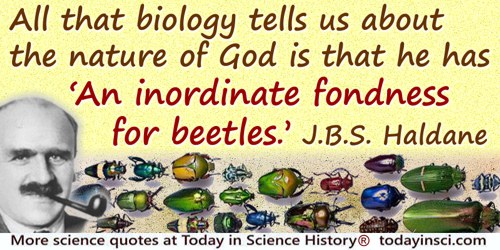
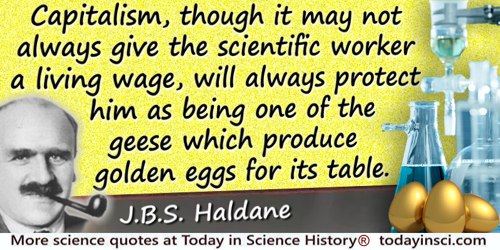
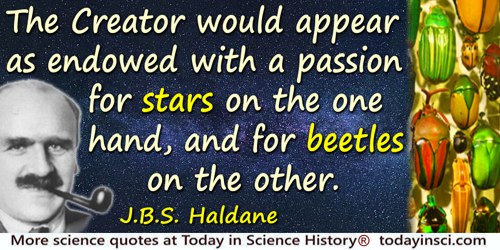
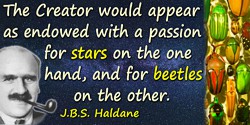
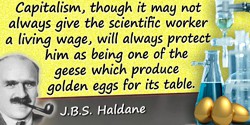
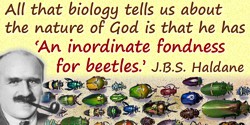
 In science it often happens that scientists say, 'You know that's a really good argument; my position is mistaken,' and then they would actually change their minds and you never hear that old view from them again. They really do it. It doesn't happen as often as it should, because scientists are human and change is sometimes painful. But it happens every day. I cannot recall the last time something like that happened in politics or religion.
(1987) --
In science it often happens that scientists say, 'You know that's a really good argument; my position is mistaken,' and then they would actually change their minds and you never hear that old view from them again. They really do it. It doesn't happen as often as it should, because scientists are human and change is sometimes painful. But it happens every day. I cannot recall the last time something like that happened in politics or religion.
(1987) -- 


